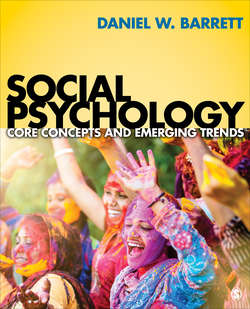Читать книгу Social Psychology - Daniel W. Barrett - Страница 156
На сайте Литреса книга снята с продажи.
Introspection
ОглавлениеWho was your third-grade teacher? It probably took you a moment, but eventually the name popped into your mind. How did you produce this answer? Easily, you respond—I just thought about it! Or maybe—I just knew it! But if I were to press you further and ask you to explain how you retrieved this from your memory, you’d likely hesitate before offering an answer. This is because you typically do not have access to the “how” you generated your response but only the response itself. Let’s look at another scenario. Suppose I were to place four blue sweaters side-by-side on a shelf. I inform you that the sweaters are of differing quality and ask you and nineteen others to individually select your preferred sweater. Unbeknownst to all of you, the sweaters are identical. Judging by the results of a similar study by Nisbett and Wilson (1977), the vast majority would pick the sweater farthest to the right. When asked to explain why, most would likely state that the one on the right was of better quality than the other three. You would be unaware that the physical placement of the sweaters had an impact on your choice. Why? Because humans often have little access to and knowledge of our internal processes. Nisbett and Wilson (1977) have provocatively argued that, although we know the result of our thought processes (e.g., what our third-grade teacher’s name was), we often do not know how we arrived at that result.
All of us engage in introspection in our efforts to better understand ourselves.
David Grossman / Science Source.
In the fascinating book Strangers to Ourselves, Timothy Wilson (2002) reviews the vast research literature on this topic that provides convincing evidence regarding the limits of introspection. Wilson shows that not only are we unaware of how are thoughts are produced, we often don’t know who we are, what we feel, or why we do what we do! In another study, participants watched a film either while a very loud power saw was operated just outside of the room or with no distracting noise (Nisbett & Wilson, 1977). Respondents were asked to rate the film on a number of dimensions, and the distraction participants also indicated whether or not the noise affected their evaluations. A majority of the distraction participants reported, erroneously, that the noise had in fact lowered their evaluation of the film. Here, participants believed a stimulus affected them when in fact it did not, and again, introspection failed to uncover the truth.
There is another way in which introspection can fail us: The process of thinking about how we feel can itself change the way we feel (T. D. Wilson et al., 1993). In one study, participants evaluated two artistic and three humorous posters and later had the opportunity to bring one of them home after the experiment. Participants in the reasons condition described why they liked each of the posters, whereas those in the control condition did not. Wilson et al. predicted and found that participants in the reasons condition were more likely to bring home a humorous poster than were control participants, most likely because it was easier to provide a rationale for preferring the humorous poster to the art poster: it was funny. When all participants were asked at the end of the semester how happy they were with their poster choice, those who had earlier listed reasons were less satisfied than the control participants, especially when they had chosen and justified selection of a humorous poster. The amusing effects of the comical poster—although humor was the initial reason for choosing it—seem to have worn off during the semester. Think about it—how many times can you laugh at the same joke?! Wilson et al.’s (1993) study demonstrates that analyzing reasons for preferences can undermine the pleasure produced by those preferences: Introspection can reduce satisfaction with one’s decisions. Similarly, another study found that analyzing reasons for liking one’s romantic partner decreased satisfaction with that partner (T. D. Wilson & Kraft, 1993).
Figure 4.1 Introspecting About Reasons Can Undermine Satisfaction
Source: Adapted from Wilson, T. D., Lisle, D. J., Schooler, J. W., Hodges, S. D., Klaaren, K. J., & LaFleur, S. J. (1993). Introspecting about reasons can reduce post-choice satisfaction. Personality and Social Psychology Bulletin, 19, 331–339.
Clearly, using introspection as a way to understand our thoughts, feelings, and behaviors has its limits (Corallo et al., 2008; E. A. Locke, 2009). Not only might we fail to understand why we act as we do, even thinking about the reasons for liking something can reduce that liking. And here we see that how our understanding of the self is inextricably tied to the limits of our reasoning and the nature of rationality itself. Attempting to achieve rationality can have interesting, if unintended, consequences for the self.
Introspection: Looking internally at the self to examine who one is, how one feels, and so forth
